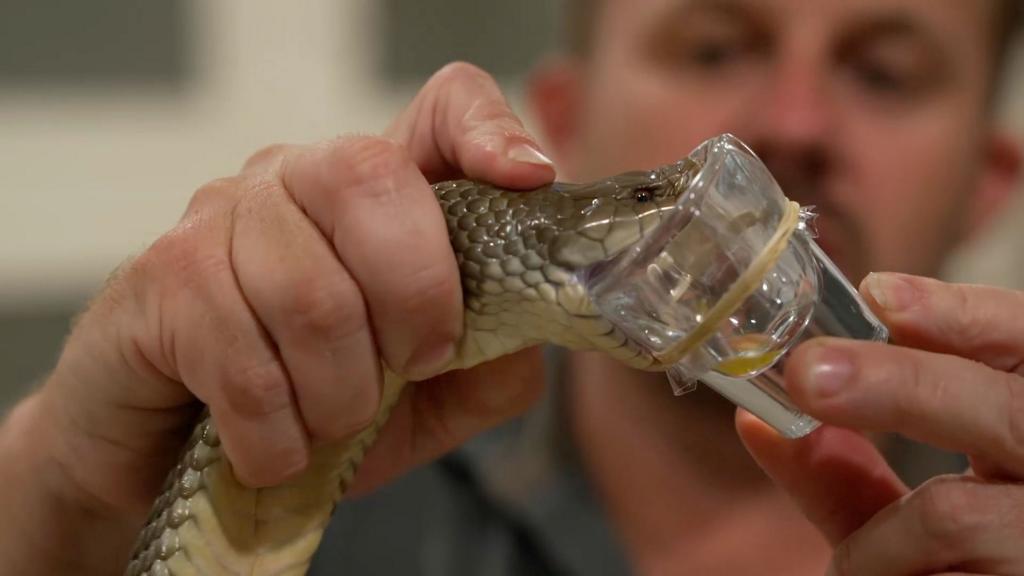With deft hands and bright pink tweezers, Emma Teni gently maneuvers a large Sydney funnel-web spider into a small container. “He’s posing,” she quips, as the spider rises onto its hind legs—a perfect position for venom extraction.
In her compact “spider milking room,” Emma extracts venom from approximately 80 spiders daily. Floor-to-ceiling shelves, shrouded by a curtain to keep the arachnids calm, house hundreds more. A child’s awestruck yet apprehensive gaze from outside the window highlights the potent danger: the spider in her hand could be lethal within minutes.
“Sydney funnel-webs are arguably the world’s deadliest spiders,” Emma states matter-of-factly. This room at the Australian Reptile Park plays a crucial role in a life-saving government antivenom program, vital in a country known for its deadly wildlife.
While the fastest recorded death from a Sydney funnel-web bite was 13 minutes (a toddler), the average is closer to 76 minutes—a timeframe significantly extended by prompt first aid. The program’s success is undeniable: no fatalities have occurred since its inception in 1981.
The program relies heavily on public participation; people are encouraged to capture spiders or their egg sacs. Emma and her team, driving a van adorned with a crocodile sticker, collect spiders from various drop-off points across Sydney.
The spiders’ danger stems from both their potent venom and their habitat: densely populated areas, increasing human-spider interaction. Handyman Charlie Simpson, a recent homeowner, encountered two funnel-webs in his garden and responsibly handed the second to a vet for collection.
“I had gloves, but should have worn leather ones,” the 26-year-old admits, highlighting the spiders’ formidable fangs. His actions, motivated by public awareness campaigns emphasizing the crucial role of venom collection, underscore the program’s community-based approach.
Emma emphasizes that the public isn’t encouraged to actively search for spiders, but rather to safely capture any encountered. “It sounds counter-intuitive,” she acknowledges, “but that spider, thanks to Charlie, will save a life.”
Collected spiders are cataloged, sexed, and stored at the park. Females are considered for breeding, supplementing public donations. Males, six to seven times more venomous than females, are used for venom extraction every two weeks.
A small amount of venom is sufficient to kill, yet collecting enough for a single antivenom vial requires milking 200 spiders. Emma, a marine biologist by training, never anticipated this career path, but now embraces her role as “spider girl,” “spider mama,” or even “weirdo,” as her daughter calls her.
The Australian Reptile Park’s contributions extend beyond spiders; snake venom has been supplied to the government since the 1950s. The park’s work is critical, given the WHO estimates 140,000 annual snakebite fatalities globally. Australia, thanks to its antivenom program, sees only one to four deaths annually.
Billy Collett, the park’s operations manager, demonstrates snake venom extraction. He expertly secures a King Brown snake, its fangs over a covered shot glass, as venom drips—enough, he says, to kill everyone in the room multiple times.
He emphasizes that snakes are not inherently aggressive, bites usually result from provocation. The collected venom is freeze-dried and sent to CSL Seqirus in Melbourne for antivenom production, a process taking up to 18 months.
The process involves hyper-immune plasma production—using horses for snake venom and rabbits for spider venom—to generate antibodies. CSL Seqirus produces 7,000 vials annually, ensuring widespread access.
Dr. Jules Bayliss, leading CSL Seqirus’ antivenom development, highlights the importance of distributing antivenom to rural and remote areas, aligning with the species prevalence in each region. The program extends internationally, notably to Papua New Guinea, where it has saved an estimated 2,000 lives.
Mr. Collett playfully refers to snakes as “danger noodles,” reflecting the Australian knack for lightheartedness in the face of danger. He assures visitors that Australia’s robust antivenom program, readily available and free, makes it the safest place to encounter venomous creatures.
Oscar Jenkins, 33, is sentenced to 13 years by a Russian-controlled court in eastern Ukraine.
Australia’s Mitchell Starc will not return to the IPL on its resumption on Saturday, leaving him clear to prepare for the World Test Championship final.
Ben Roberts-Smith says he now intends to appeal the landmark judgement in the High Court.
Erin Patterson is on trial for allegedly murdering three relatives and injuring another with a toxic meal.
Yang Hengjun is serving a suspended death sentence in a Chinese jail on espionage charges.

